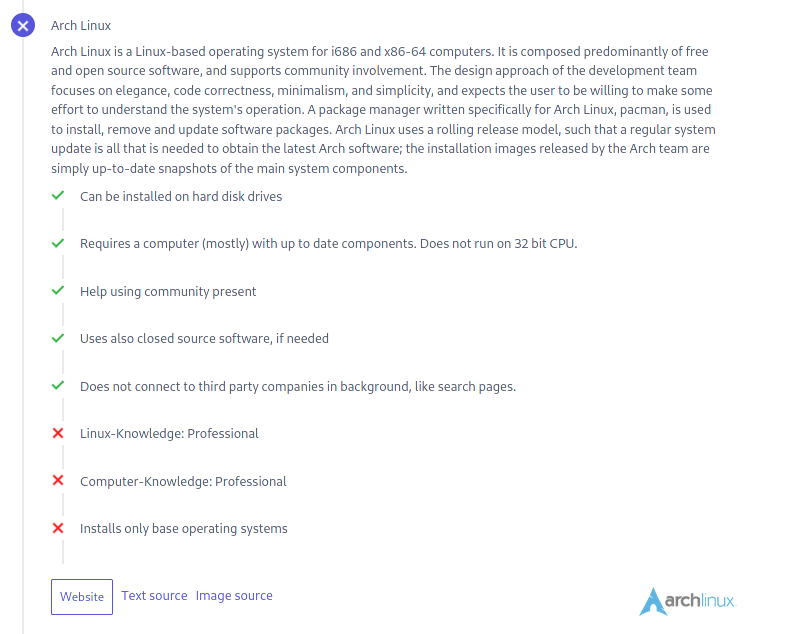I think it’s brilliant. No matter what folks put it - The answer is Arch. . . It’s always Arch.
If you don’t tell the truth!

It uses Arch BTW?
I tried the Beta version.
Jeebuz, dat ding is useless! I got so many Distros recommended, it’s almost back to square. At least Manjo and vanilla Arch were between the chosen distros. Weirdly not EOS. 
I got:
- Arch
- Qubes
- Void
- Nixos
- Gentoo
No idea about Qubes, Void and Nixos.
I got all those, plus Arch…thankfully. ![]()
…for programmers. You must’ve missed the part where I said I’m not a programmer ![]()
My DuckDuckFu failed me miserably here. This thread is raising more (and more off-topic) questions with me than it gives me answers tbh ![]()
(Also, my brain is seriously fighting me these last few days, which doesn’t help me one bit…)
The impression I get from what you’ve told me is that I’d have to code the whole bloody OS together myself, but I’m likely wrong about that too…
You can get *buntu as well.
I tried to input everything oposit to my first try and I got Ubuntu.
Also ![]()
Some distributions may use special features, such as security enhancements. Which of the following features do I want to use (if any)?
This question is too far away from your requirement profile. You can answer it, but you can safely skip it.I wish to run all applications in isolated containers. I am aware that this may cause the distribution more difficult to use.
I know what ‘systemd’ is and wish to avoid that.
I wish to install packages from other distributions without additional effort.
I don’t want to use package managers. I wish to install everything from source.
I’m probably terrible at explaining, but in NixOS you configure everything with one file, rather then going into lots of settings applications etc
My understanding of NixOS is that you can run things with their own lib versions and so on without conflict - but not containerized. You could think of it as form of advanced package management 
I think NixOS is a bit like OS-X: each application is a self-contained package with it’s own lib entries. Could take up a lot of space?! 
Indeed, it’s quite cool.
I’m not sure about OS-X, but that concept is known as ‘static linking’. this is not what nixos does iirc, but rather it dynamically links to specific versions of libraries, and you can have more than one version in the nix “store”
You can do the same in OS-X but I’ve only done it a few times. Also that was in much older versions. I would be quite surprised if you can do that now. Apple’s operating system is very “restrictive” compared to, say, 10 years ago. I still have an old MacBook running 10.6 Snow Leopard and in many ways I prefer the simplicity of it and the lightness of the system. It very rarely gets used though, all my main boxes run Linux now, mainly EnOS. 
I got void as first, which is very surprising to me as I was sure it would say arch. I find void too complicated.
I think it is biased. If you are very pro security and choose liking running from USB sticks, it throws void as the first answer.
You can definitely statically link on any operating system, if you’re talking about different versions it should be able to be done but it’d require someone to develop a tool for it
hmm, void is very much general purpose like arch, not at all a security oriented distro